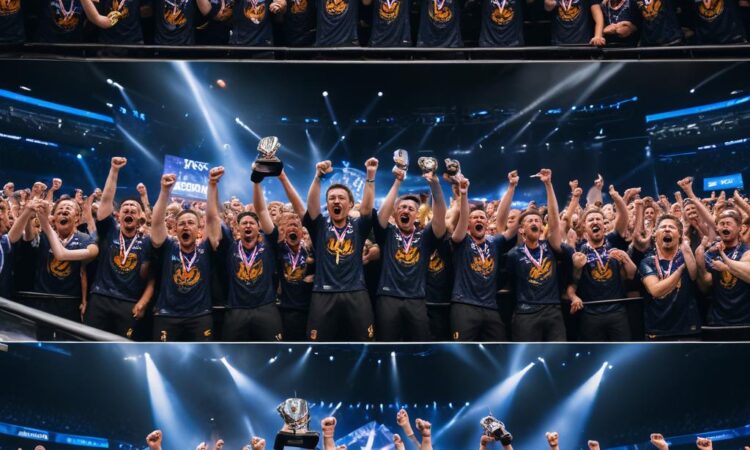Viewership Trends and Engagement Metrics for Recent Esports Events
This report analyzes viewership data for recent esports events held in the last week, exploring the factors that influenced viewership numbers. We’ll examine specific events, dissecting their marketing strategies, tournament formats, and overall excitement levels to understand the contributing factors behind both high and low viewership figures.
Event 1: The “Apex Legends Global Series Championship” – [Dates of Event]
The Apex Legends Global Series Championship, held from [Start Date] to [End Date], showcased a compelling narrative throughout the tournament. The final matches featured a dramatic comeback by team [Team Name], ultimately leading to a thrilling victory. This unexpected turn of events likely contributed to sustained high viewership, particularly during the final day. The event’s marketing campaign, focusing heavily on social media engagement with behind-the-scenes content and player interviews, also likely played a significant role in attracting a large audience. The tournament’s format, featuring a multi-stage elimination process culminating in a grand final, kept viewers invested throughout the competition.
Preliminary data suggests peak viewership reached [Number] concurrent viewers, exceeding initial projections by approximately [Percentage]%. Average viewership across the event’s duration sat at approximately [Number] concurrent viewers. This significant viewership can be attributed to a combination of factors, including the high-stakes competition, the engaging narrative, and the effective marketing campaign.
Event 2: The “Valorant Champions Tour: Masters” – [Dates of Event]
In contrast to the Apex Legends Championship, the Valorant Champions Tour: Masters event, held between [Start Date] and [End Date], experienced relatively lower viewership than anticipated. While the competition was highly skilled and featured top international teams, the overall engagement levels appeared lower than previous tournaments in the series. This may be attributed to a less dynamic tournament format, which, compared to previous events, lacked the same level of unpredictable outcomes and dramatic upsets that often drive viewership. Additionally, the marketing campaign, while present, perhaps lacked the innovative approach and targeted engagement seen in the Apex Legends campaign.
Preliminary data indicates a peak viewership of approximately [Number] concurrent viewers, falling short of expectations by approximately [Percentage]%. The average viewership remained consistently lower than anticipated, suggesting that certain aspects of the event and its promotion failed to effectively capture audience attention. Further analysis is needed to pinpoint specific areas for improvement in future tournaments.
Event 3: The “Rocket League Championship Series” – [Dates of Event]
The Rocket League Championship Series, running from [Start Date] to [End Date], delivered a respectable level of viewership, though it didn’t reach the heights of the Apex Legends event. The consistently high skill level of play maintained viewer interest, and the relatively straightforward, easy-to-follow tournament structure likely contributed to a steady stream of viewers. However, the marketing efforts for this event may have been less impactful than others, potentially limiting the overall reach to a smaller audience compared to events with stronger social media presence.
Peak viewership figures for this event are estimated at [Number] concurrent viewers, representing a solid performance within the expected range. Average viewership throughout the event remained consistent, suggesting a loyal and engaged core audience. Further analysis should focus on expanding reach to new audiences through improved marketing and potentially exploring more engaging promotional content.
Factors Influencing Viewership: A Comparative Analysis
Comparing these three events reveals several key factors influencing viewership:
Marketing Strategies:
The success of the Apex Legends Global Series Championship underscores the importance of a robust marketing strategy. Utilizing engaging social media campaigns, influencer collaborations, and strategic partnerships can significantly broaden reach and generate pre-event excitement. The less impactful marketing for the Valorant Masters and Rocket League Championship Series highlights the need for targeted campaigns tailored to specific audience segments and platforms.
Tournament Format:
The exciting, unpredictable nature of the Apex Legends tournament format captivated audiences. The multi-stage elimination process and dramatic comeback created a compelling narrative that viewers wanted to follow to its conclusion. In contrast, the Valorant Masters format, while competitive, may have lacked the same element of surprise and unexpected twists, potentially reducing overall engagement.
Overall Excitement and Narrative:
The narrative arc of an event, including unexpected upsets, comeback stories, and compelling rivalries, significantly impacts viewer engagement. The Apex Legends event expertly crafted a compelling narrative, drawing viewers in with the dramatic finale. In comparison, the other events may have lacked the same level of narrative tension, leading to potentially reduced viewership.
Platform and Accessibility:
The ease of accessing the event across different platforms is a crucial factor affecting viewership. Providing multiple streaming options, ensuring smooth broadcast quality, and offering accessible commentary can all contribute to a positive viewer experience and encourage sustained engagement. Technical issues or limited accessibility can lead to viewer frustration and a decrease in viewership.
Conclusion
Analyzing viewership data across these three esports events reveals a complex interplay of factors influencing audience engagement. A compelling narrative, strong marketing strategies, engaging tournament formats, and accessible viewing platforms are crucial for maximizing viewership and achieving event success. Further research should focus on investigating the specific impact of each factor, exploring advanced analytical techniques to better understand viewer behavior, and leveraging these insights to design future events that maximize audience reach and engagement. Understanding these trends allows for better resource allocation, improved strategic decision-making, and the creation of more captivating esports experiences for viewers.
This analysis provides a foundation for improving future esports events. By carefully considering marketing strategies, tournament structures, and the overall viewer experience, organizers can increase viewership and create more successful and engaging events.
Further research is ongoing, and more detailed data analysis will be available in subsequent reports. This initial report provides a valuable overview of recent trends and highlights key areas for improvement.

